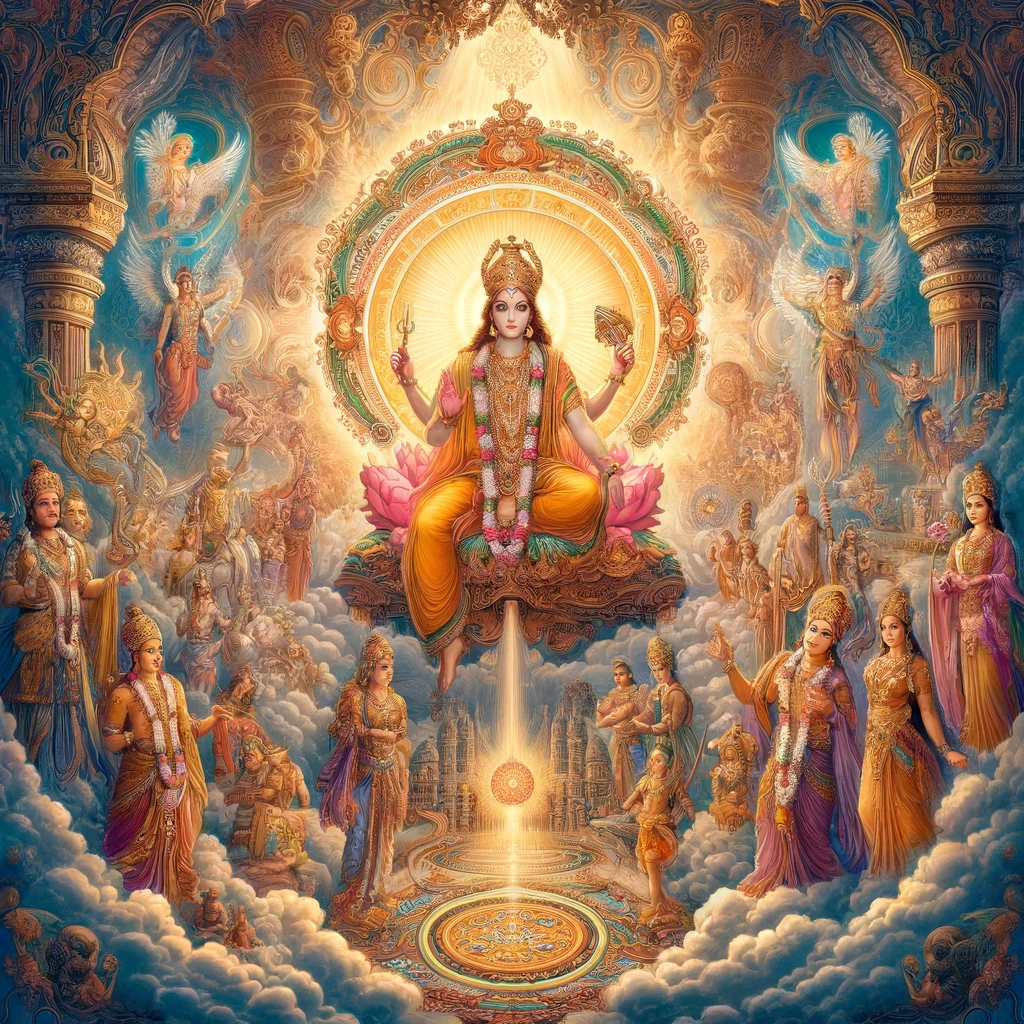ಭೂತಭವ್ಯಭವನ್ನಾಥಃ ಪವನಃ ಅನಲಃ
ಕಾಮಹಾ ಕಾಮಕೃತ್ ಕಾಂತಃ ಕಾಮಃ ಕಾಮಪ್ರದಃ ಪ್ರಭುಃ || 32 ||
bhūtabhavyabhavannāthaḥ pavanaḥ analaḥ
kāmahā kāmakṛt kāṃtaḥ kāmaḥ kāmapradaḥ prabhuḥ || 32 ||
bhūtabhavyabhavannāthaḥ (ಭೂತಭವ್ಯಭವನ್ನಾಥಃ)
The name of the Lord, represented by the syllable 'Om,' signifies the meaning of creation, preservation, and destruction of the world. It signifies the power that exists throughout all time - past, present, and future, the Lord of the past, present, and future (the governing power). In 'Om,' 'A' represents the past, 'U' represents the present moment, and 'M' represents the future. 'Nath' means the master or the one from whom we seek and obtain. He is the singular solution to all our problems and the ultimate power that can grant our desires.
In another way, the name can be divided as follows: "Bhuta + Bhavi + Abhavat + Nath. The Lord is the master of all. 'Bhutas' refer to the righteous souls moving towards the Lord; 'Bhavis' are those who remain at a certain distance from the Lord and revolve around Him, and 'Abhavat' signifies those who move away from the Lord into the darkness. He is the master of all.
pavanaḥ (ಪವನಃ)
The word "ಪವನ" (Pavana) typically means "wind" or "the deity of the wind" in its popular sense. However, it can also be interpreted as follows: "In the context of the name of the Lord, 'Pavana' signifies the deity of the wind, which controls our life. Bhagavan, who is present in the deity of the wind that governs us, is called 'Pavana.' Another meaning of this name is 'motion' or 'constant movement.' 'Pavate iti Pavana' means that which continuously moves. The Supreme Being, who resides within each living being as the inner controller, continuously provides motion in various forms. The moment His movement stops within our body, we become lifeless. In the Upanishads, Bhagavan is referred to as 'Vana,' where 'P' stands for 'protection' – the power that protects us and all the deities such as Brahma. 'Vana' signifies that He is the object of worship with love and devotion for all and the desired goal of all. Bhagavan, who dwells in a thousand forms among a thousand beings, continuously protects and sustains, and is therefore called 'Pavana.
analaḥ (ಅನಲಃ)
"ಅನಲಃ" (Anala) means "fire," and in the context of scriptural definitions, this has a special meaning. Anala means the one who is never satisfied no matter how much is given! We refer to two things as 'Anala' among us. One is 'fire,' and the other is 'a person's desire'! Fire is the primary symbol of worship for Lord in the earth. Worship of the Lord through the Agnihotra ritual is of supreme importance. No matter how many offerings we make to fire, it always accepts them. Fire is purer than earth and water. For this reason, in the scriptures, fire holds a special place. In the Rigveda, it is said, 'Agni Meele Purohitam,' "ಅಗ್ನಿಮೀಳೇ ಪುರೋಹಿತಂ”. Omnipresent in the fire the effulgent God accepts our offering and is ‘Anilaha’. Furthermore, 'Anala' means one who is never satisfied. The Lord is subordinate to His devotees; no matter how much is given to the devotees, He is never satisfied! Therefore, the Lord, who is subordinate to His devotees, is called 'Anala'.
kāmahā (ಕಾಮಹಾ)
Here, 'kāma' means 'kā + a + ma,' where 'kā' means depressed, ‘a’ means ignorance and ‘ma’ means desire. ‘Ha’ means destruction. Hence The Lord who destroys the wicked desires born out of ignorance is 'Kāma-hā.' As Krishna he destroyed Kamsa and Jarasandha, as Lord Rama he destroyed Ravana and Kumbakarna, as Varaha he destroyed Hirayaksha, as Lord Narashima he destroyed Hiranyakashupu, such a lord never fulfills the desires of the wicked. We should pray to Him to free us from our 'evil desires' and fulfill the desires of His devotees.
kāmakṛt (ಕಾಮಕೃತ್)
The father of good desires, O Lord! The one who created the desire for desires. The Lord, who destroyed Kamsa, the one who was devoted to evil desires, 'Kalanemi', is Kamakrita.
kāṃtaḥ (ಕಾಂತಃ)
The Lord is the ever-charming one, desired by all. He bestowed beauty even to Manmatha (the God of Love), so He is the most charming among the charming. 'Kamantah' here means the ultimate source of joy, as 'kam' refers to the end or tip, and 'antah' means the end of joy. The Lord is the supreme delight. He bestows joy to the wise and the opposite ‘grief’ to the sinners! Beyond the greatest happiness attained through lineage by Shatananda (the son of Gautama and Ahalye), God who is the pinnacle of happiness is kāṃtaḥ.
kāmaḥ (ಕಾಮಃ)
The Lord is the one desired by all. He is the complete embodiment of knowledge and joy that is impossible to measure and hence is known as kāmaḥ - the one desired by all.
kāmapradaḥ (ಕಾಮಪ್ರದಃ)
The Lord is the most priceless treasure desired by all discerning individuals. He fulfills the desires of devotees according to their karma, yet there is no end to the satisfaction He derives from fulfilling the desires of His devotees. With His thousands of hands, He grants the desires of millions of devotees, and thus, He is known as 'Kamapradah,' the fulfiller of desires.
prabhuḥ (ಪ್ರಭುಃ)
The Lord is all-capable and can fulfill the desires of millions of devotees. He knows what to give to whom and when. We, as parents, do not fulfill all the wishes of our children because they do not have the understanding of what is good and what is not. In contrast, the Lord, being omniscient, fulfills the desires of His devotees in a way that is conducive to their well-being. He is the benevolent ruler who grants the desires of His devotees accordingly and is known as ‘prabhuḥ.’


